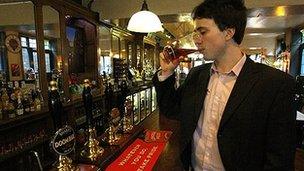Are ankle tags the answer for tackling parents with drink problems?
- Published
Dr Claire George demonstrates how the ankle bracelet works
For the past six months the Family Drug and Alcohol Court in London has been piloting a scheme, external using alcohol-monitoring ankle bracelets in child protection cases where parental alcohol addiction was a concern.
The trial is the first of its kind in the UK, but the bracelets are widely used in the US.
They measure alcohol levels in water vapour on the surface of the skin. The measurements are recorded automatically every 30 minutes.
Supporters of the device say they can be used to help parents prove their sobriety and resist the temptation to drink.
The Family Drug and Alcohol Court (FDAC), built on the American model of a "problem-solving court", tries to improve the way care proceedings work: judges help parents to overcome their addiction with the assistance of a team of specialists attached to the court.
The court is run by the Tavistock and Portman NHS Foundation Trust and children's charity Coram.
An evaluation of the project by researchers from Brunel University found mothers assisted by the court were more likely to be reunited with their children.
District Judge Nicholas Crichton, who pioneered FDAC, told the BBC it came out a desire to do more than just "process" cases: "In the worst scenarios I am seeing parents who have been class A drug addicted from age of 10, 11 or 12.
"I became very depressed with just removing child after child after child from the same family and not seeing anything change."
Remote reports
Now the court has completed a six-month pilot of the ScramX alcohol monitoring bracelet, supplied by drug-testing firm Concateno.

The ankle tag makers say it can monitor whether parents with alcohol problems are staying sober
Judge Crichton says it gives the court more confidence that a parent has stopped abusing alcohol.
The bracelets wirelessly report alcohol levels every 30 minutes. Infrared and temperature sensors ensure that any tampering with the device can be easily identified.
Although they are bulky and have to be worn around the ankle next to the skin, users of the devices say they are quickly forgotten.
The devices are not waterproof and those wearing them must shower rather than take a bath.
Parents' choice
FDAC made use of the ankle bracelets voluntary, but 13 out of 14 parents accepted an offer to use the technology.
Although a formal evaluation of the device has yet to take place, one parent who spoke to the BBC, but did not wish to be named, said she believed it was a major factor in her not drinking alcohol in six months.
"The longer you are in sobriety the more chance you've got of staying sober… and it's just impossible to drink with it on," she said.
As a result of her progress the court decided not to place a young daughter in care. She no longer wears a device, but says she would like to have worn it for longer.
The UK suppliers of the ankle bracelets say they are no more expensive than other methods of testing for alcohol, but provide the court with more useful information.
But in spite of the court's success its central government funding has ended, and it is now reliant on support from local authorities.
A Coram spokeswoman said the pilot had been funded by several government departments - Department for Education, the Ministry of Justice, Home Office, and the Department of Health - and local authorities.
She said: "FDAC is now funded by five London boroughs, following the successful conclusion of the pilot, and has also been replicated with Gloucestershire County Council."
A Ministry of Justice spokeswoman said it was a privately-run pilot, which was not overseen or being piloted for the government.
Listen to Chris Vallance's report on The World At One on BBC Radio 4 at 13.00 GMT on Friday, 22 March or afterwards on iPlayer.
- Published10 February 2012